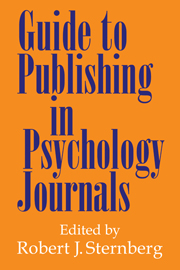11 - Writing for Your Referees
Published online by Cambridge University Press: 05 February 2012
Summary
The best psychological journals share relatively few attributes. Some contain only empirical articles; others contain no empirical articles. Some publish only short articles; others publish only long articles. Some encourage free submissions; others are by invitation only. One thing these journals have in common, however, is that the articles submitted to them are refereed: The articles go through a process of peer review before a decision is made as to their fate.
One way to improve your chances of getting your articles accepted is to write with your future referees in mind. In writing and then reading over your article, think the way your referees will think. Writing with referees in mind substantially, even drastically, improves chances of a favorable outcome for your article. So many of the rejections authors receive easily could have been averted had those authors written with their future referees in mind. This article contains a dozen tips on how to improve your chances of acceptance by writing with the referees in mind.
1. Proofread. The simplest thing you can do is to proofread your article before you submit it. Referees rarely reject articles solely because they are chock full of typographical, grammatical, or word-processing errors. But such errors severely irritate most referees and are likely to put them into a rejecting frame of mind. Thus, the referees are likely to magnify the importance of other flaws and then to recommend that your article get the axe.
- Type
- Chapter
- Information
- Guide to Publishing in Psychology Journals , pp. 161 - 168Publisher: Cambridge University PressPrint publication year: 2000
- 2
- Cited by

